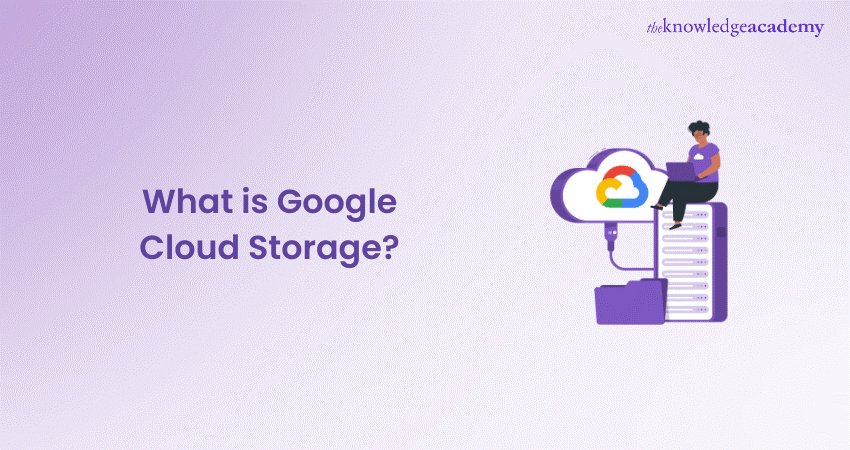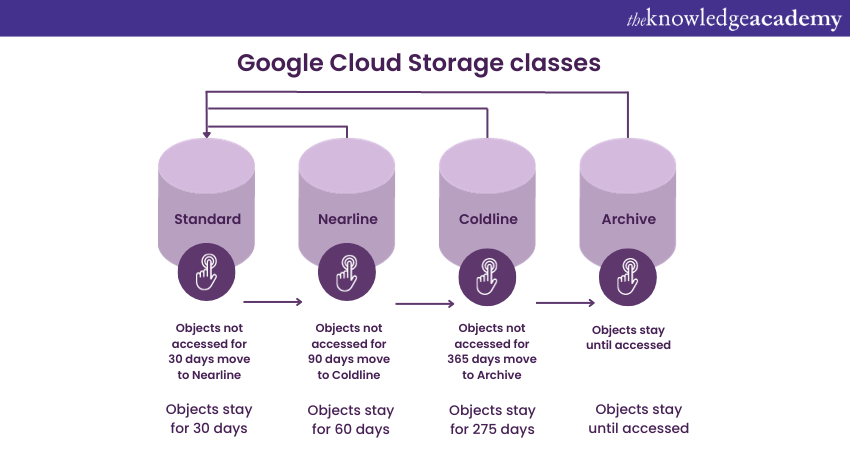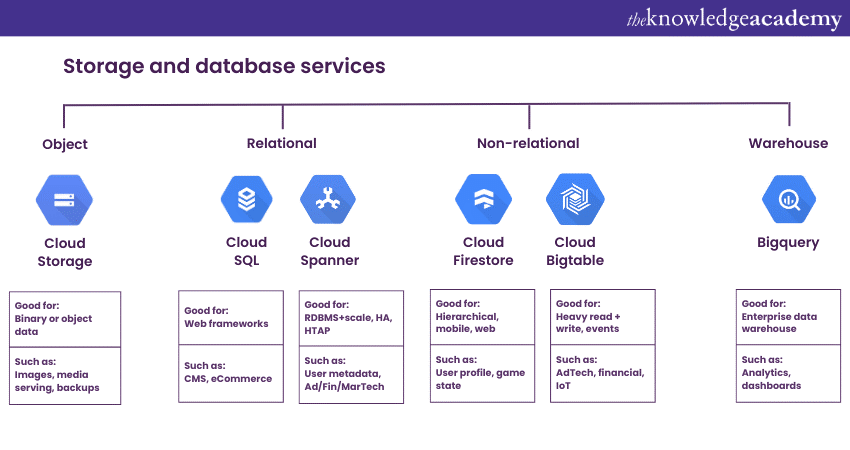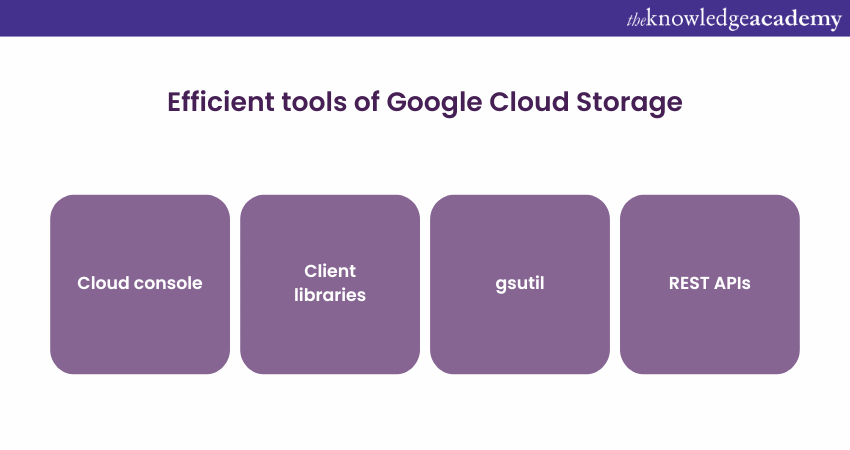We may not have the course you’re looking for. If you enquire or give us a call on +1 6474932992 and speak to our training experts, we may still be able to help with your training requirements.
We ensure quality, budget-alignment, and timely delivery by our expert instructors.

In today’s digital era, data is the heartbeat that keeps everything running smoothly. With global data creation projected to grow by over 180 Zettabytes by 2025, the need for robust storage and access solutions grows. Enter Google Cloud Storage—a versatile, all-in-one powerhouse for managing everything from small backups to colossal data sets.
Seamlessly integrated with Google’s suite of tools, Google Cloud Storage offers unprecedented flexibility, security, and scalability, as evidenced by its £ 25 billion revenue in 2023. Whether you’re a startup or an enterprise, this blog uncovers how Google Cloud Storage unlocks endless possibilities for growth and innovation for your business. Let's dive in!
Table of Contents
1) What is Google Cloud Storage?
2) Key Features of Google Cloud Storage
3) Google Cloud Storage Classes
4) What are the Different Google Cloud Storage Options?
5) Cloud Storage Tools
6) Google Cloud Storage Use Cases
7) Google Cloud Pricing Options
8) Google Cloud Competitors
9) Conclusion
What is Google Cloud Storage?
Google Cloud Storage (GCS) is a fundamental component of Google's extensive range of cloud computing services, bundled under the umbrella term Google Cloud Platform (GCP). This product, which was officially launched in 2010, offers an integrated, flexible, and secure option for data storage and retrieval via the internet.
The genesis of Google Cloud Storage lies in Google's necessity to develop robust and scalable infrastructure solutions that could manage the extensive datasets required for their diverse and complex array of services. As one of the world's largest and most influential technology companies, Google naturally amassed considerable expertise in handling large datasets. They soon realised their wealth of experience in this area could be leveraged to offer an object storage service that could be utilised by developers and businesses across the globe.
GCS has become an increasingly essential tool in our modern, digitised world. With data generation expanding at an unprecedented rate, GCS provides an invaluable service that is affordable and reliable, thus enabling businesses to store and analyse their data. One of the standout features of GCS is its automated backup and lifecycle management capabilities. These features are critical for businesses, as they streamline the data management process, making it an indispensable tool in our increasingly digital world.
Deploy and scale your apps effortlessly with Google App Engine! Focus on coding while we handle the infrastructure. Try it today!
Key Features of Google Cloud Storage
Google Cloud Storage offers a broad range of features to efficiently and reliably store, share, and manage data:
1) High Capacity and Scalability: It supports storing objects of terabyte size and allows numerous buckets per account.
2) Strong Data Consistency: Google Cloud Storage ensures strong read-after-write consistency for uploads and deletes. Once an object is uploaded, you can immediately download, delete, or access its metadata. Any attempt to access a deleted object promptly returns a 404 Not Found status. List operations are eventually consistent from anywhere on the Internet.
3) Availability: Upload operations are atomic, meaning an object becomes available only after it's fully uploaded. Objects are always consistent; there are no partial or corrupted objects.
4) Google Developers Console Projects: It's accessible through the Google Developers Console, allowing you to manage project members, billing, authentication, and work with various APIs. You can have multiple projects, each with its Google Cloud Storage instance.
Get started with Google BigQuery and master analytics using the Google BigQuery Analytics PDF.
5) Bucket Locations: You can specify geographic storage locations for your buckets, choosing between Europe and the US.
6) REST APIs: Google Cloud Storage provides two RESTful programming interfaces (XML and JSON APIs) for creating applications using standard HTTP methods.
7) OAuth 2.0 Authentication: It utilises OAuth 2.0 authentication and authorisation, allowing token-based authentication for applications to act on your behalf.
8) Authenticated Browser Downloads: You can offer browser-based authenticated downloads to individual Google account holders by setting up Google account-based ACLs and sharing a scoped URL for authenticated downloads.
9) Google Account Support for Sharing: Access Control Lists (ACLs) control access to objects and buckets, enabling sharing with the world, Google groups, Google-hosted domains, or specific Google account holders.

Google Cloud Storage Classes
In Google Cloud Storage, classes define the different tiers of data storage, each tailored to varying use cases concerning data access frequency, data retention periods, and budget requirements. Choosing the right storage class allows you to determine the trade-off between the cost of storing your data and how often you expect to access it. Here's an explanation of each:

1) Standard: The Standard Storage Class in Google Cloud Storage is the default choice and offers the highest level of availability and performance. It's best suited for data that is accessed frequently or requires low-latency access. For instance, a media company could use the Standard Storage Class to store and deliver high-definition video content to their users, ensuring seamless streaming with minimal buffering.
2) Nearline: The Nearline Storage Class is a more economical choice for data that is accessed less frequently, typically less than once a month. While storage costs are lower, access costs are slightly higher compared to the Standard Class. An example might be a company storing monthly financial reports. These reports aren't required on a daily basis but might need to be accessed at the end of each financial quarter.
3) Coldline: The Coldline Storage Class is designed for data that users access even less frequently, typically less than once a quarter. It offers lower storage costs than Standard and Nearline but higher costs to retrieve data. An example use case could be a business storing yearly tax records. Such data doesn't need to be accessed regularly but is important to retain for compliance purposes.
4) Archive: The Archive storage class provides the lowest cost solution for long-term data storage with very infrequent access, possibly less than once a year. This class has the lowest storage cost but the highest retrieval cost. Archive storage could be used, for instance, by research institutions that need to retain large volumes of raw research data for years, even if they rarely need to access it.
Interested in GCP? Get started with our Google Cloud Storage Training!
What are the Different Google Cloud Storage Options?
Google Cloud Platform offers a multitude of storage options based upon varying use cases, making it extremely popular among developers and enterprises. These range from data warehousing for in-depth analytics to Machine Learning and real-time application data for app developers. Some other options are specialised for archival storage for long-term data retention and solutions for website hosting and content management. The core options in Google Cloud can be categorised as follows:

Persistent Disk
Google Cloud's Persistent Disk is a robust block storage service that operates somewhat differently from Google Cloud Storage. While GCS, an object storage service, stores data as individual units or 'objects', Persistent Disk employs a block storage approach. This method arranges data into blocks within a sector, each identifiable by a unique identifier, which purely marks its location without the incorporation of metadata.
The block-based approach delivers a unique blend of speed and flexibility, making it an ideal fit for systems requiring high-speed operations. In terms of performance, Persistent Disk offers a consistently low-latency experience coupled with high Input/Output Operations Per Second (IOPS). These traits make it a crucial component for certain applications, such as databases or file systems, that require swift, low-latency access to disk volumes.
An integral feature of Persistent Disk is its seamless integration with Google Cloud services such as Google Compute Engine (GCE) and Google Kubernetes Engine (GKE). This compatibility ensures a unified experience, as Persistent Disk manages the data storage when using GCE or GKE, guaranteeing consistency and reliability. With automatic encryption, in-zone replication, and auto-resizing, Persistent Disk proves to be a secure and adaptable solution for diverse data storage needs.
Unlock seamless cloud management with Google Cloud Shell. Learn how to automate tasks and boost productivity. Get started now!
Cloud Filestore
Google’s Cloud Filestore service is an ideal solution for applications requiring shared file storage. It is a fully managed Network Attached Storage (NAS) service that provides a simple and integrated file system interface. This facilitates shared file system capabilities, offering the ability to share data across multiple compute instances. Cloud Filestore offers reliable and high-speed file storage for deploying a Content Management System (CMS), hosting a dynamic website and processing data-heavy workloads.
Cloud Filestore is available in two performance tiers: Standard and Premium. The Standard tier is suitable for general file storage in Google Cloud, while the Premium tier caters to high-performance needs, such as video processing or machine learning. This tiered system offers flexibility, allowing you to select the tier that matches your performance requirements and budget, making Cloud Filestore a cost-effective and adaptable solution for various file storage needs.
Try our Architecting Infrastructure With Google Cloud Platform Training today!
Firestore and Bigtable
Google Cloud offers Firestore and Bigtable. Firestore is a versatile, scalable NoSQL cloud database ideal for mobile, web, and server development projects. Its key features include synchronising data across client applications via real-time listeners and providing offline support for mobile and web apps, enabling a seamless user experience (UX) regardless of connectivity.
In contrast, Bigtable is Google's NoSQL Big Data database service. It's specifically crafted for large-scale operational and analytical applications. Bigtable caters to businesses dealing with vast amounts of data, offering a reliable platform for handling such volumes. It's a great option for a variety of applications, ranging from user analytics to financial data analysis.
Stand out in your cloud career! Explore Google Cloud interview questions and learn how to answer them effectively to land your ideal job.
Cloud SQL and Cloud Spanner
Google Cloud provides comprehensive solutions for relational database requirements through Cloud SQL and Cloud Spanner. Cloud SQL is a popular relational database service that is fully managed. It supports database systems such as MySQL, SQL Server, and PostgreSQL. This service takes the burden of database management off the user's shoulders, effectively handling tasks like replication, patch management, and failure detection.
In contrast, Cloud Spanner is a globally distributed relational database service providing a blend of traditional and modern database functionalities. It delivers the benefits of a conventional relational database, including ACID transactions, relational schemas, and SQL querying. However, Cloud Spanner goes a step further by offering the scalability that's characteristic of non-relational databases. This makes it a hybrid solution that combines the consistency of relational databases with the robust scalability of non-relational ones.
Unlock the potential of Google Cloud Console! Manage, deploy, and monitor your cloud resources effortlessly. Start your journey now!
Cloud Storage Tools
Mostly, there are four crucial tools that help to interact with the Google Cloud Storage Services. Let’s talk about them in the following points:

a) Cloud Console: It renders a browser-based web informational interface to handle the records.
b) Client Libraries: The client libraries permit users to effectively manage data with the help of their preferred popular programming languages. Some of those languages include C++, C#, Go, Java, Node.js, PHP, Python and Ruby.
c) gsutil: It is a standard command line tool /terminal that permits users to interact with the contents of the cloud storage in real-time.
d) REST APIs: It runs on top of the JSON or XML API that handles the data.
Unlock your potential with a career in Google Cloud! Explore the competitive Google Cloud Engineer salary and elevate your tech journey today!
Google Cloud Storage Use Cases
Here are some primary use cases for Google Cloud Storage:
a) Backups and Archives: Google Cloud Storage offers cost-effective, high-durability storage for data that isn't frequently accessed. This makes it an excellent choice for reducing the expenses associated with backups and archives while maintaining quick access. The stored backup data is versatile and can be utilised for more than just recovery, thanks to low-latency access across all storage classes through a unified API.
b) Integrated Repository for Analytics and Machine Learning: Google Cloud Storage provides high availability and performance within a single region, making it well-suited for computing, analytics, and Machine Learning (ML) workloads within specific geographic areas. Its strong consistency ensures the accuracy and reliability required for analytics tasks.
c) Media Content Storage and Delivery: For low-latency, high-query-per-second content delivery to users dispersed across various geographic regions, Google Cloud Storage's geo-redundant storage with top-notch availability and performance is an optimal choice. This service caters to the availability and throughput demands for streaming audio or video directly to applications or websites.
Unleash the capabilities of cloud computing with our Google Cloud Platform Fundamentals today!
Google Cloud Pricing Options
Like other public Cloud offerings, Google Cloud services follow the pay-as-you-go model. No upfront payments are needed, and users only pay for the Cloud resources they consume. However, specific terms and rates may vary from service to service.
Some services with long-term commitments may offer discounts. For instance, committed use discounts on Compute Engine resources (such as GPUs and instance types) can yield more than 50% discounts. Google Cloud adopters must consult with in-house cloud architects and Google sales staff and utilise Cloud pricing estimation tools like Google Cloud Pricing Calculator, to estimate the pricing of prospective Cloud deployments.
Supercharge your AI capabilities with Google Cloud AI tools! Dive into the best solutions to advance your projects and stay ahead of the curve.
Google Cloud Competitors
Google Cloud has competitors in the public Cloud market, and AWS and Microsoft Azure are leading this competitive landscape. Here's a brief exploration of these Cloud providers:
1) AWS: It's the oldest and most mature public Cloud, emerging as a public service in 2006. It offers the broadest range of general tools and services. It boasts the largest market share by appealing to a wide customer base, including individual developers, significant enterprises, and government agencies.
2) Microsoft Azure: This one appeared in 2010 and has proven attractive to Microsoft-based environments. This has made the transition of workloads from data centres and even building hybrid environments easier. Azure is the second biggest public Cloud, often catering to more significant enterprise users.
3) Google Cloud: Appearing in 2010, Google Cloud is currently the smallest of the three major public clouds. However, It has developed a strong reputation for its computing, network, big data, and machine learning/AI services.
However, the differences between these providers are diminishing as all three are evolving to offer similar suites of services and capabilities. For example, AWS Controllers for Kubernetes and Azure Service Operator is matched by Google Cloud's Config Connector which is used for App modernisation. Only a handful of Google Cloud services are not matched by an AWS and/or Azure analogue.
Unlock your cloud engineering potential! Follow our How to become a Google Cloud Engineer guide to gain the skills needed for success in the cloud industry!
Conclusion
Google Cloud Storage offers an array of solutions, each tailored to cater to unique needs. Considering factors such as real-time access and performance requirements, you can select a storage service that fits your application. The optimal choice can profoundly influence application performance and overall business success. Therefore, it's vital to comprehend each Google Cloud Storage option and stay updated with their continuous innovations, ensuring you make decisions that best support your evolving requirements.
Interested in how networks work? Try our Networking With Google Cloud Platform Course!
Frequently Asked Questions
Do You Have to Pay for Google Cloud Storage?

Yes, you do have to pay for Google Cloud Storage, but the cost depends on the type and amount of storage you need. Pricing is based on several factors, including the amount of data stored, the storage class (e.g., Coldline, Archive, Standard, Nearline, etc.), and the location of your data.
Is Google Cloud Safe?

Google Cloud offers excellent hardware-level security to ensure customer data is highly durable/available and safe from physical attacks. The user is ultimately responsible for any data stored in Google Cloud.
What are the other resources and offers provided by The Knowledge Academy?

The Knowledge Academy takes global learning to new heights, offering over 3,000 online courses across 490+ locations in 190+ countries. This expansive reach ensures accessibility and convenience for learners worldwide.
Alongside our diverse Online Course Catalogue, encompassing 19 major categories, we go the extra mile by providing a plethora of free educational Online Resources like News updates, Blogs, videos, webinars, and interview questions. Tailoring learning experiences further, professionals can maximise value with customisable Course Bundles of TKA.
What is the Knowledge Pass, and how does it work?

The Knowledge Academy’s Knowledge Pass, a prepaid voucher, adds another layer of flexibility, allowing course bookings over a 12-month period. Join us on a journey where education knows no bounds.
What are related courses and blogs provided by The Knowledge Academy?

The Knowledge Academy offers various Google Cloud Certification Courses, including the Google Cloud Platform Fundamentals Training, Google BigQuery Training, and Google Search Appliance Fundamentals. These courses cater to different skill levels, providing comprehensive insights into Google Cloud Functions.
Our Cloud Computing Blogs cover a range of topics related to Google Cloud Storage, offering valuable resources, best practices, and industry insights. Whether you are a beginner or looking to advance your Cloud Computing skills, The Knowledge Academy's diverse courses and informative blogs have got you covered.
Upcoming Cloud Computing Resources Batches & Dates
Date
 Google Cloud Platform Fundamentals
Google Cloud Platform Fundamentals
Fri 21st Feb 2025
Fri 4th Apr 2025
Fri 6th Jun 2025
Fri 26th Dec 2025






 Top Rated Course
Top Rated Course


 If you wish to make any changes to your course, please
If you wish to make any changes to your course, please


